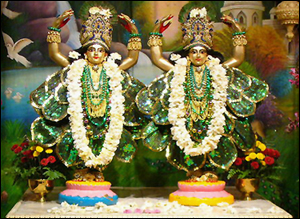ISKCON: North American Leaders Explore Balance of Power, Share Best Practices
By Vyenkata Bhatta dasa/ISKCON Communications | May 19, 2007

HOUSTON, TX: More than thirty temple presidents, and a handful of Governing Body Commissioners, representing North American chapters of the International Society for Krishna Consciousness (ISKCON) gathered in Houston, Texas on May 17 to kick off a three-day regional meeting. Organizers of the meeting hope to bring together the two facets of ISKCON's leadership in order to foster greater accountability and cooperation, and explicitly address the need for a balance of power.
"Its more about disposition than position," said Laksmi Nrsimha Dasa, representative of the New Ramana Reti temple in Alachua, Florida. "The underlying principle should be to create a system where we can review and discuss things in an open forum that encourages love and trust."
Significantly, the meeting comes at a time when a debate on ISKCON's power structure has been making the rounds in some circles. Recently, North American leaders proposed concerted legal actions to safeguard the temples from being overtaken by individuals with a deviant agenda; critics of these actions, however, have raise concerns that they seem to represent a "centralization" of power that Srila Prabhupada disapproved of.
In his will, ISKCON founder-acharya Srila Prabhupada decreed that the Governing Body Commission (GBC)—an international body of senior devotees entrusted to oversee geographical areas and specific projects—serve as the ultimate managing authority for the institution. At the same time, Srila Prabhupada also articulated his desire that each ISKCON temple be run autonomously. Meeting attendees strived to understand and negotiate that tension.
"To say that the GBC is the 'ultimate authority' is not to say that it can act whimsically and arbitrarily," said GBC member Hridayananda Goswami. "Rather, we ensure balance by acting on reasonable principles within then confines of a constitutional government."
Los Angeles temple president Svavasa Dasa agreed. He reminded the assembly that while it is crucial to address concerns about centralization, it is equally important not to give in to an extremist rejection of all structure or unified strategy.
"Merely saying, 'Nothing can ever be centralized' is absurd when [for example] it is 1:30 in the afternoon, and everyone is wandering around looking for lunch," he said, drawing laughter from the attendees. "There is a better way to understand and apply the principle properly."
To discuss matters in a more focused way, the delegates later broke into separate GBC and temple president groups.
Addressing the temple presidents, Ravindra-svarupa Dasa—who serves as both a president and GBC member—drew on history to demonstrate that Prabhupada intended a unique system of checks and balances.
"In 1976, Srila Prabhupada decided that temple presidents should also meet and review the GBC resolutions," he said. "If two-thirds of the temple presidents took issue with a resolution, they could send it back to the GBC for re-consideration."
According to Ravindra-svarupa, that system eventually whittled away, as fewer and fewer temple presidents elected to attend annual meetings in Mayapur, India.
Svavasa felt that a clearer understanding of the relationship between GBC and temple president was necessary in order for each to more effectively serve the unified mission.
"The last thing a GBC [member] wants or needs to do is to 'parachute in' to deal with the problems of a local temple," he said. "We have to ask ourselves why that happens."
The temple presidents went on to discuss the need for a stronger support network, by which they could help troubleshoot common concerns, collectively protect ISKCON from threats, and share best practices.
To that end, the meetings concluded with an inspiring round-table discussion in which each leader was called upon to share the positive things going on with their temple or project.
As each participant highlighted the inspiring activities he or she is involved in, the group responded with cheers, applause, and—in many cases—the frantic scribbling of notes and good-natured promises to "steal" one another's ideas.
"I think this was the most important part of our gathering together," said Pancha Tattva Dasa, president of ISKCON's St. Louis temple, "To hear from one another and learn from each temple new and exciting ideas to serve Srila Prabhupada's mission. It gives us faith, hope, and a sense of direction."














